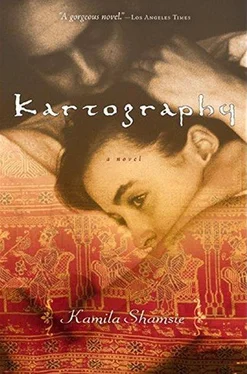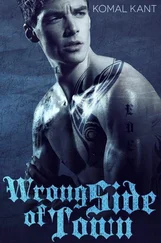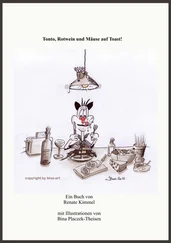‘If it’s true, that makes things worse,’ Zia said, screeching off, clearly as keen to get out of Mehmoodabad as I was. ‘He’s probably with the MQM and you just don’t want to get involved with someone who has anything to do with these political groups.’
‘Why is he obviously with the MQM?’ I said. ‘He didn’t mention political affiliations.’
‘It’s the Muhajir Qaumi Movement, isn’t it? And he’s a Muhajir with grievances. Two plus two equals four.’
‘I’m a Muhajir, Zia.’ I poked his shoulder.
‘Oh, don’t give me that. You’re nothing. You’re just a burger. And thank God for that.’
‘You macho Sindhi ass,’ I said with a yawn. It was too early in the morning for a full-length replay of this little exchange — one that Zia and I trotted out every so often almost as a set routine — which deflected the differences in our backgrounds.
‘Only half my ass is Sindhi. The other half is Punjabi.’
Karim didn’t join our laughter. When I turned to look at him, his eyes were wide, terrified. ‘I shouldn’t have come back,’ he said.
Zia reached over and touched my knee then. He saw how hurt I was by the comment, but Karim was oblivious. I thought of another car ride, heading to, rather than from, the airport. Karim had sat opposite me and drawn a map and even the fact that he couldn’t have known it was the last time we were to be together for the next seven years didn’t temper the corrosiveness of that memory. Look up, I had wanted to say then. I’m here. But he hadn’t looked at me then and he wasn’t looking at me now.
‘Well, then, go home,’ I said. ‘If you have a home to go to.’
‘Raheen, cool it,’ Zia said.
‘Let her continue, Zia.’ Karim crossed his arms and looked at me in the manner of an eagle staring down a sparrow.
‘There’s really nothing more to say. Why don’t you turn around and leave, and I’ll draw you a nice map of all the places you might have visited while you were here. I’m sure for you that’ll be better than actually having to deal with the realities of this place and the people in it.’
‘Why the hell do you keep harping on about maps?’ he said.
I didn’t have the first idea how to respond to that one. We continued to glare at each other, while Zia turned the music up again and started singing along boisterously, as though he were listening to hard rock rather than a qawaali. Why did I keep harping on about maps? How had they become the symbol of everything that had gone so wrong, so inexplicably, in my relationship with Karim?
‘Strabo and Eratosthenes,’ I said. ‘That’s what I was going to talk to you about on the phone the other day.’
‘Yes?’ He looked at me cautiously, as though he thought I was drawing him closer just so that I could hit him over the head with a mallet.
I had first encountered mention of the two of them while researching a paper on Homer at college, and that’s really when I decided it was time to get in touch with Karim again, although I had to wait until I wrote that Calvino paper before I was able to decide how to make the first move. Eratosthenes, the grandfather of cartography, was the first man to make a distinction between scientific and literary mapping. Prior to Eratosthenes, no one ever said that cartography should concern itself with science and facts rather than stories; the distinction didn’t really exist. The Odyssey was considered as valuable a tool of mapping as were the charts and eyewitness accounts of sailors and travellers. But Eratosthenes’ decision removed Homer, and all other poets, from the corpus of cartography.
In the furore over this move, which lasted through generations, Eratosthenes’ greatest critic was the cartographer Strabo, who said that Homer depicted geographical truths in the language of poetry, so it was absurd to deny him a role in the realm of cartography. I loved the idea of those early cartographers who thought Odysseus’ voyage was as valid a source for map-making as the charts of travellers who had actually set sail themselves.
Back then, of course, maps weren’t used for travel. They were mainly used for illustrating stories. There stands Mount Olympus. That’s where Theseus fought the Minotaur. That kind of stuff. So maps weren’t about going from point A to point B; they were about helping someone hear the heartbeat of a place. I explained this, and then I reached for Karim’s hand and held it at the very tips of his fingers. He didn’t draw away. ‘Seems to me like we’re Strabo and Eratosthenes, Karimazov. I want you to pay attention to the stories that define Karachi, and you want to know what the name of the road connecting Gizri to Zamzama is, and how many people have died there in the last year.’
But even as I said all that, I wondered why any of it should have been anything more than a minor irritation in our friendship. And then I was back, again, to the question I had asked so many times it even invaded my dreams: what did I do to make him cut up my letters?
His hand closed on my wrist so tightly I almost cried out. ‘You want to hear the heartbeat of a place? Do you know how hard your heart beats when you’re lost? Do you know what it is to wander out of the comfort of your own streets and your own stories?’ He drew a deep breath. ‘Which stories do you want me to pay attention to? Or, more to the point, which stories have you deliberately turned away from, Ra, and why?’
I pulled my wrist out of his grip and then turned away from Zia’s uncertain, sympathetic, exasperated eyes, which were meant as much for Karim as for me. I cranked up the volume of the music as high as it would go, so that none of us could hear our own thoughts.
All around us, Karachi kept moving.
. . .
1971
‘Of course there won’t be war,’ said Asif, running his fingers through his luxurious mass of hair. ‘Everyone’s playing brinkmanship, that’s all. Here’s what’ll happen: Mujib will back down on his Six Points, give up the whole idea of a decentralized federal system of government in exchange for some political and economic concessions towards East Pakistan. Once he does that, Yahya will invite him to form the government, and at that point Bhutto will also take his place as leader of the opposition. It’s the only sane, rational, not to mention cheerful, choice. Mujib’s no zealous revolutionary, and, besides, whatever the Bengali masses might want, they’re just rabble, and our army will decimate them if they try to make some kind of one-legged stand. No one wants to be slaughtered.’ He snapped his fingers at the Ampi’s waiter and asked for more ice.
‘No one wants to be enslaved either,’ Maheen said, waving down at Laila and her new husband, who had entered and taken a table on the ground floor. ‘Yasmin, don’t you love what she’s wearing?’
‘My God, she is so gorgeous. What does she see in him?’ Asif shook his head. ‘And come on, Maheen, isn’t enslaved a little too dramatic a word?’
‘Nothing dramatic about it,’ Ali said. ‘Just look at the statistics.’
‘Oh, you and your statistics,’ Asif said with a laugh.
‘Well, but just think about it. East Pakistan is the majority wing of the country in terms of population, and yet…’ He started to count off his fingers, ‘It gets less than 30 per cent of foreign aid allocation, less than 20 per cent of civil service jobs, less than 10 per cent of military positions, fewer schools, fewer universities, it makes up near 70 per cent of the country’s export earnings but receives the benefits of less than 30 per cent of our import expenditure.’
‘All these stupid bloody politicians on their own power trips,’ Zafar said, picking up the menu and looking at the dessert section. ‘Why don’t Mujib and Bhutto just have a duel to the death, pistols at dawn, and leave the rest of us out of it?’
Читать дальше












